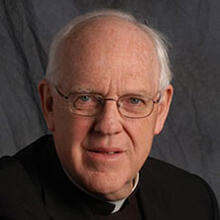Review: Church politics can be challenging, but there are blessings in belonging.
Tears come easier to me these days—maybe because I am older. Sometimes, while preaching, I will touch a deep vein and find it difficult to go on. I might be reading an autobiography and see a scene evoking a memory from my own journey—and I have to lay the book down as memories flood in. Such was my experience reading Frank J. Butler’s autobiography, Belonging: One Catholic’s Journey.
Butler lost his father at a young age, and his mother raised a family of six. At the age of 13, Butler entered a seminary in Little Rock, Ark., and spent eight years there in a world he generally describes as wonderful—a world in which one learned to pray and to work hard and to live with others.
In his studies, along with traditional Thomism, he was fortunate to be exposed to contemporary thinkers like Kierkegaard, Jaspers, Marcel and Heidegger. Butler also writes of moments of prayer in which questions of his own future came to the fore: “Where am I going with my life?” “Do I really want to be a priest?”
Butler describes well the give and take of the sometimes clashing politics of church organizations.
Butler was sent by his bishop to The Catholic University of America in Washington, D.C. As he left the seminary in Arkansas, he thought, “I was moving on from a familiar, endearing place that had shaped my outlook on life, connected me to God in a deep loving friendship; and awakened a restlessness and questioning that would not let go.”
Butler eventually left the seminary and married. He would continue to work for the church in one way or another for the rest of his life: in Catholic health care, for the U.S. Catholic bishops, in Catholic philanthropy, on the “Support Our Aging Religious” campaign, in aiding the church in former communist countries and more.
Butler describes well the give and take of the sometimes clashing politics of church organizations. In many places where he worked, hierarchical power, defensiveness and conflicts over money interfered with the implementation of many good ideas.
Butler ends, however, on a beautiful note: the baptism of his granddaughter, Eleanor, in a primarily African-American Catholic Church in Norfolk, Va.:
I am grateful this story continues through the lives of those who, like Eleanor, we welcome into this great faith. May they and all who have shared this story come to know the treasure of the Catholic community—its enduring witness to the gospel, its prayer, sacraments, and loving service. These have been, for this glad traveler, the dazzling blessings of belonging.
This article also appeared in print, under the headline “A glad traveler,” in the March 2021, issue.









